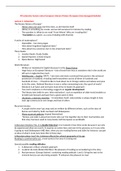All extensive lecture notes European Literary History (Europese Literatuurgeschiedenis)
Lecture 1: Adventure
The literary history of Europe?
- History does not exist, but time does, as do histories itself
- History is something we create, and we tell ourselves for instance by reading
- The question is: What do we read? From Where? Why am I reading this?
*translation as a given, as a way of dealing with diversity
A series of masterpieces?
- Impossible – too many pages
- How about forgotten/neglected texts?
- How about less canonical, but no less important texts?
Three books:
1. Jaroslav Hasek: Osudy Svejka
2. Daniel Maximin: d’Aimé Césaire
3. Djuna Barnes: Nightwood
World literature
- Written or translated in English because it is the lingua franca
- Huge focus on European literature > lots of texts from Asia or anywhere else in the world are
left out or neglected too much
- Weltliteratur – Goethe (1827): ‘I am more and more convinced that poetry is the universal
possession of mankind, revealing itself everywhere and at all times in hundreds and
hundreds of men.... I therefore like to look about me in foreign nations and advise everyone
to do the same. National literature is now a rather unmeaning term; the epoch of world
literature is at hand, and everyone must strive to hasten its approach.’
- Too much emphasis on chronology suggests an organic development
- The literary text (with its own ‘time mechanism’, such as repetition of older texts) enables us
to both look forward and back from a given point in time
- Literature: a memory machine – it remembers itself, and provides a unique insight in how
each age constructs its own image and that of others
Recurrent stories:
- A couple stories won’t go away and are written by different writers, such as the story of
Romeo and Juliet by both Lou Reed and Shakespeare
- Many recurrent patterns (repeat themselves)
*Romeo and Juliet is about two lovers who can’t be together due to their rival families and
that story has been used in many books, both European as worldwide
Is literature timeless? No, it is double-historical: it is involved in how time works because it can only
be experienced when we read it. It requires an action here and now in the presence so it is you who
is going to read Shakespeare AND then, when you are reading Romeo and Juliet for instance, you get
an idea of what it must have been like in those days
Is literature place- less? No, it always reflects the cultural geography of its age
Reading is a performative act, a text starts to live once it is being red
Several possible reading attitudes:
1. A distanced, critical, scholarly approach
2. Le plaisir du texte (Roland Barthes): the pleasure of reading so surrendering to the story
3. Real presences (George Steiner): combining reading attitude 1 and 2: living the text in the
moment but you are also being analytic enhances the pleasure to read
, What is literature, which text is literature? Depends on your own perspective and taste so unable to
answer that question: literature is defined by perspective
Culture as text (spoken, written, sung, drawn, painted, filmed etc.): we should not limit ourselves so
looking at different things with a text in it (something with structure) expand our cultural
structure because things such as films and gaming are important these days so it should belong to
culture
(Tegere, tectum (Latin): to weave): reference from a very early age on about making texts and
making texture which is something that has to do with not just story telling but also the act of
survival
Narrative texts: a hero(ine) attempts to reach his/her goal by overcoming certain obstacles
The hero as demi-god, superhuman (certain qualities such as huge strength)
- The hero as leading character (conquest and survival mostly) in ancient epics such as
Gilgamesj, Illiad and Odyssey, Mahabarata, Celtic sagas, Nibelungen, Icelandic sagas, South-
Slav epic ballads
But anything can become the subject of a story such as Bambi and Cinderella and anyone or anything
can become the hero, so not just a human but also animals and fairy tails
Sea travels: genre that goes back many hundreds of years
- Being ship-wrecked and storms are one of the most difficult challenges to encounter
> examples: Moby-Dick, Hornblower, N’zid (post-colonial novel)
- Dark sites of the conquest in the book Heart of Darkness such as murder
Once the sea is conquered:
- Going to space is another huge challenge to encounter, Star Trek for example
- A challenging thought: science fiction for now
Wrath, anger, rage, being wronged: subject of a story
- Similarly, in the Nibelungenlied or the heroes of Ulster so it had nothing to do with emphasis
or being a true hero out of goodness of the heart
Pre-courtly culture: from pre-courtly to courtly, there is a change in the characteristics of the knights
and the heroes during the Christian Middle Ages
Archaic: society of warriors (tribal)
- Honour and privilege
- Mutual rivalry
- Warriors virtue: undaunted, lack of fear
Examples:
- Homer, Illiad (ancient- Greek) Virgil, Aeneid (Roman)
- Beowulf (old- English), Nibelungenlied (old- German), Icelandic sagas
Late echoes: mobster culture of “respect”, (The Godfather); neo-barbaric films (Schwarzenegger etc.)
Tales about knights in the Middle Ages: Chanson de Roland and Lancelot, Knight of the Cart
- All characteristics about pre- courtly culture
‘Pre-Courtly’ barbarism increasingly located outside Europe in the 19th and 20th century, often
justified as a civilizational mission: a critique of this in Herzog’s Aguirre, the Wrath of God (1972)





